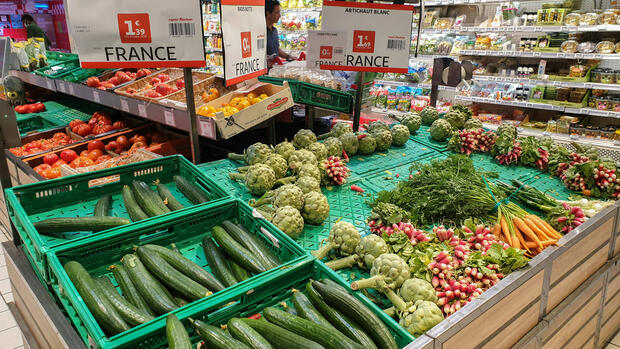Athens, London, Madrid, Paris, Rome All over Europe, many can no longer afford to shop for groceries as they used to because of high inflation. According to the Federal Statistical Office, spending on food in Germany fell by 10.3 percent within a year up to March.
The Germans have not restricted themselves so much since 1994 and thus for almost 30 years. This also reflects the situation in other European countries, people are more price-conscious when shopping.
For the French, the motto of eating like God in France no longer applies. Many French buy lower quality and less overall.
Figures from the statistics institute Insee show that spending on food fell by 8.5 percent in 2022, and the trend will continue in 2023.
According to Insee, food prices rose by April by more than 15 percent compared to the previous year. In surveys, 68 percent of households said they had changed their consumer behavior, especially young people, households with children or less money.
Most supermarkets have been offering a range of cheap staples since March. More and more French are taking advantage of the offers.
Cold kitchen with the British
There are no such anti-inflation products in the UK. The government in London rejects a price cap for food. According to a Yougov online survey from the end of April, 14 percent of the Britons surveyed said that they had smaller portions or skipped meals altogether.
UK food and drink prices rose more than 19 percent in March from a year earlier, according to the UK Statistics Office.
(Photo: IMAGO/Xinhua)
The non-governmental organization Food Foundation reports that low-income families often turn to cold food donations in order to keep down the energy costs for cooking, which have also risen sharply.
UK food and drink prices rose more than 19 percent in March from a year earlier, according to the UK Statistics Office. Dairy products in particular have become between 30 and 40 percent more expensive.
According to the British central bankers, the high prices for food are an important reason why the inflation rate of recently ten percent is falling only slowly.
Italians appreciate good food and pay other bills later
In Italy, prices for basic foodstuffs rose by 12.6 percent in April compared to the previous year, according to the national statistics office Istat. The Italians are hit harder by the price increases than many other Europeans because salaries here have stagnated for years.
Most Italians try to save more on quantity.
(Photo: dpa)
Nevertheless, very few people want to do without quality: According to the Coldiretti agricultural association, there are increasing purchases from discounters, and many households are also looking more at offers from supermarkets.
But most Italians try to save more on quantity. According to the latest Istat figures, the volume of food purchases in March 2023 fell by around five percent compared to the previous year.
>> Read here: If necessary, France wants to use taxes to persuade the food industry to reduce prices
In Italy, good food is firmly anchored in the lifestyle – sometimes even unpaid bills are paid later than doing without a healthy diet. On the other hand, visits to restaurants and bars have decreased, according to a study by the retail chain Coop. As in the pandemic times, people are cooking more at home and baking bread or pizza themselves, for example.
Spaniards do without olive oil
The Spaniards have changed too. They buy less and different food in the supermarkets. Food consumption has fallen by 8.7 percent over the past year, according to a study conducted by market research firm Kantar. This year the trend continues.
In April, Spaniards bought 14.7 percent less groceries than in the same month last year. The most obvious was the renunciation of olive oil, the price of which has risen particularly sharply in recent months, with a minus of 38 percent.
The price of olive oil has risen particularly sharply in recent months.
(Photo: IMAGO/Westend61)
It was followed by fish (down 21 percent), fresh vegetables (down 19 percent), milk and dairy products (down 18 percent), and meat (down 16 percent). In view of the high inflation, the government had reduced VAT on basic foodstuffs, but not on fish and meat.
With the end of the Covid restrictions, however, the Spaniards went out more again and ate in bars and restaurants. Non-domestic consumption increased by 16.8 percent.
Greeks are cutting back on grocery purchases
In Greece, inflation is particularly noticeable in food. The inflation rate fell to three percent in April. That was significantly less than the euro zone average of seven percent and the lowest value since October 2021. But for food prices, the state statistics agency Elstat calculated an inflation rate of 11.4 percent.
67 percent of Greeks have reduced their grocery purchases.
(Photo: dpa)
Bread even went up in price by almost 23 percent year-on-year, and meat by 20 percent. According to market studies, almost one in three Greek consumers is now switching supermarkets when they find cheaper prices in another store.
>> Read here: What can be learned from large corporations
In 2010, only seven percent did. 84 percent make targeted use of special offers, and four out of ten buyers always choose cheaper products. 67 percent have reduced their grocery purchases.
More: Less variety in the supermarket – manufacturers are cutting their range
